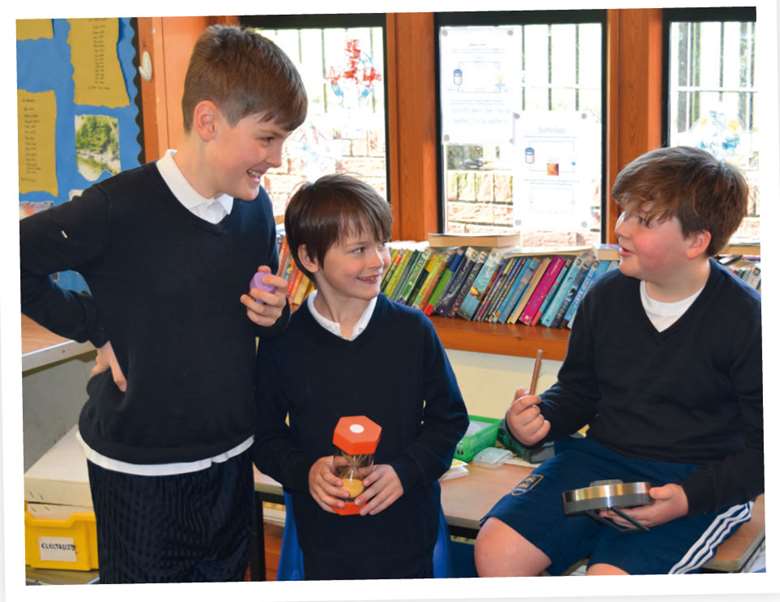Let the wolf in
Campbell Russell
Sunday, March 1, 2020
Campbell Russell explores the benefits of encouraging younger students to engage with socio-political issues through drama

CAMPBELL RUSSELL
Since last October, I have been running drama workshops with years 4 and 5 in a small village primary school. These workshops have led us into writing a play for performance. In this article I set out examples of how their involvement has impacted on the students' thinking. The workshops and the play are based on A Wolf's Tail. This is an allegorical tale designed to introduce children to the world of uncritical thinking and populist politics. We've looked at stereotyping; false news; asylum seekers; critical thinking and constructing an evidence based persuasive argument.
A lack of funding may partly explain the absence of the arts in education. However, this is only one strand. Roger and Annie Kirk run a charity, the Helen Foundation, which aims to provide arts experiences for children and young people in the Teignbridge area. Each year they offer schools funding for arts-based work but increasingly are finding it difficult to find takers. The narrowing of the curriculum and the pressure on schools to be successful means staff are unwilling to take the risk of dedicating time to the arts when it could be used for teaching ‘proper subjects.’
Crucial life skills
Those who lobby for the arts often choose to counter the argument used about the economic value of subjects by referring to the contribution made by the entertainment industry to the UK economy. However, I would argue that there is a far more fundamental point that can be missed here, and that is the contribution of drama to the education of children in the broadest sense. The World Economic Forum asserts that problem solving, critical thinking and creativity are the key skills required for future success.
The Royal Shakespeare Company's Time to Listen (2009) found that young people valued drama as it helped them prepare for life by developing their critical thinking and capacity to interpret the world around them; building self-belief, confidence, empathy, appreciation of difference and diversity.
In addition to developing these key skills, the arts can be the medium through which greater understanding is achieved. Helen Kirk, in an unpublished thesis, examined the role of theatre in education (TIE) to deepen understanding. The study examined how TIE could help children and young people improve their understanding of the Holocaust. She concluded: ‘(TIE) lends itself to learning through doing, encouraging young people to form their own views on what they see, and on any issues that arise from the watching or participatory elements of TIE.’
Nurturing critical thinking
I have seen this deeper understanding develop in the workshops. In one, for example, the group were asked to examine evidence from a number of sources to establish the guilt of two wolves charged with the murder of Granny Hood. They examined the evidence and decided the wolves were innocent. They were then told the wolves had confessed. Evidence was forgotten and wolves convicted. The group then played out the confessions and concluded that they were unsafe. However, while numbers pronouncing their guilt fell, it didn't fall back on the original evidence. The discussion that followed was priceless.
On another occasion, groups had to discuss how they might present an argument. The scenario is that some pigs have been rescued from certain oblivion – a typhoon having ripped through their straw houses. Saved by the wolves the animals co-exist, but the pigs then discover that the story peddled about their young going to holiday camps when they are taken away is a lie, and plead with the wolves for their relatives in twig and stone houses to be rescued. There is opposition and arguments are created and presented. Some weeks later, when we wanted to introduce this argument into the performance, I decided to use the simple device of having one half of the class shout for the pigs while the other half shouted against. One child told me he would need to swap seats as he was being asked to express a view contrary to his true opinion. He wanted to stick to the principle that he'd established in the workshop.
Creating confident students
Life lessons are being learned, but the other impact is on the pupils’ ownership of the process. ‘Why don't we…’ is a question I hear a lot as we prepare for our big performance. Is this a consequence of the workshop preparation or increased confidence? Improvement in engagement is evident. During another workshop one pupil, who from day one seemed only interested in drifting into a dream world, suddenly became animated when presenting evidence that the transportation of young pigs was something more sinister than a holiday trip. He's subsequently taken on a major role in the production.
We talk of keeping wolves away from the door; to let one in is a risky business. The headteacher of this school deserves credit for taking the risk. I refuse to plead guilty to ‘taking time away from proper subjects.’ We are enhancing real learning.

